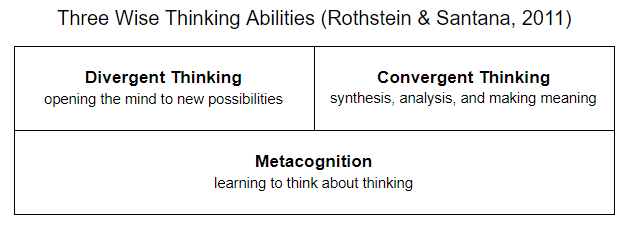This brief post is a reflection prompted by the following questions:
What opportunities do you currently provide to: (a) enhance students’ knowledge building and (b) enable them to celebrate and showcase their knowledge?
What role might technology play in diversifying knowledge building and/or expression in your content area?
Does the idea of promoting students’ divergent thinking about your content inspire you or scare you? Explain and give reasons why you think divergent thinking opportunities should be embraced or avoided.
More than ever, technology plays a prominent role in enhancing students’ knowledge building and expression. Digital texts as well as digital tools have great potential, when effectively integrated into instruction, to enable both convergent and divergent thinking. Rothstein and Santana (2011) refer to convergent thinking as the “ability to analyze and synthesize information and ideas while moving toward an answer or conclusion.” Divergent thinking is “the ability to generate a wide range of ideas and think broadly and creatively.” Metacognition, “the ability to think about one’s thinking and learning”, completes the critical thinking triad, to which the authors refer as being “the three wise thinking abilities.”
Creativity requires “constant shifting, blending pulses of both divergent thinking and convergent thinking, to combine new information with old and forgotten ideas. Highly creative people are very good at marshaling their brains to tap into both kinds of thinking.” (Rothstein and Santana, p.17) Therefore, we need to plan instruction that stimulates and capitalizes on both thinking abilities if we wish to contribute to the development of both critical and creative individuals. Therefore, digital texts and tools have the potential of enhancing the various types of learning activities (Harris & Hofer, 2009) that leverage these thinking abilities, ultimately enabling learners to hit the learning objectives.
Rothstein, D. & Santana, L. (2011). Make Just One Change – Teach Students to Ask Questions


Nice post..